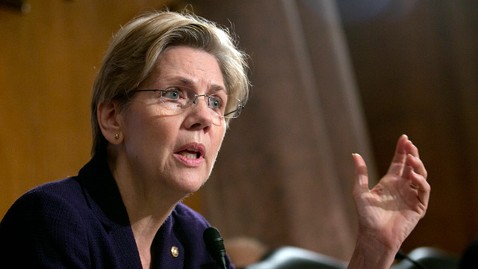The Harsh Realities of the Student Debt Crisis Elizabeth Warren Won't Tell You

The Harsh Realities of the Student Debt Crisis Elizabeth Warren Won't Tell You
By: Patrick Hedger, Policy Director-American Encore
With graduation season upon us, Senator Elizabeth Warren (D-MA) is ramping up the talk on higher education and the growing levels of student loan debt. There is no doubt that student debt is an issue that is stunting economic growth in this country and leaving behind a lost generation of overqualified and underemployed youth. The disagreement occurs when Senator Warren plays on the cause of all of our fallacious economic policies, which is the intuition to demand that “Congress/government do something!” What Senator Warren, her faithful followers, and millions of slighted students across the country don’t realize is that the root of the problem is that government has already “done something” and what they did has drastically inflated the price of education.
Student loans are widely available at very low interest rates. The federal government itself almost exclusively provides them. It used to be that the government simply fronted the money for banks to issue loans at below-market rates, but now, following a change strapped to the Affordable Care Act, the government has cut out the middleman and provides the loans directly. Either way, the government has for many years now directly provided the money for students to pursue higher education. By doing so, the government is able to socialize the risk of lending to 18 year olds with meager personal property claims and zero credit history to the hundreds of millions of taxpayers. This allows for the low interest rates. The low interest rates mean that students are able to borrow more money than they would otherwise be able to afford. The same thing happened, and is happening, in the housing market. Interest rates were held low so home prices went up because people could afford more home. This lead to the housing crisis and now this practice is leading to an education crisis as well.
Students are able to borrow hundreds of thousands of dollars at pennies on the dollar without realizing the full ramifications of their decision for at least four years. This ready access to funds for higher education has done two things. First, it has made a four-year degree all but a required experience. Employers now require a four-year degree in many professions where one would otherwise not be required. Further, pursuing a four-year degree has become a must-have experience for America’s youth. University attendance seems so commonplace now that there is a stigma associated with forgoing the additional schooling and electing to go to technical colleges or enter the workforce. There’s also the added factor of the romanticization of the college experience in popular culture driving kids to want to experience it for themselves. Here is the hard truth that almost no one has been willing say until now: 1. Most people and jobs don’t really require degrees and 2. Many kids are going to college purely for the social experience and with little regard for their education and careers.
Secondly, easy access to astronomical sums of money for students is driving universities to spend, spend, and spend with reckless abandon. Major universities across the country can’t seem to add beds and amenities fast enough. Professor salaries have become exorbitant, like Senator Warren’s $400,000 Harvard salary to teach a single class. Universities are also hiring thousands of superfluous support staff to manage countless institutional offerings outside of the primary goal of education. Some institutions seem to almost be preying on the fact that students taking on massive debt have no idea what they are getting into. They are exploiting the obvious yet unspoken truth that too many kids are going to college to simply have a good time. Dorm facilities and other amenities for students have become downright luxurious at several large institutions. Listen to these examples from an ABC News report: Texas Tech University has a water park for students that spans over two acres, complete with slides and a lazy river.

The University of Missouri has an indoor swimming area inspired by the cave-like pool at the Playboy Mansion.

The examples could go on and on from high-end sports and recreation facilities to luxury dorm living with single bedrooms, walk-in-closets, private bathrooms, and kitchens adorned with granite counters and stainless steal appliances. What happened to bunk beds? The answer is student loans.
UT Austin dorm common area:

In the hope of providing students with all the resources they would need to pursue higher education, the federal government has directly subsidized the massive growth in college tuition. Colleges now compete for students and their blank taxpayer-backed checks. While students and universities should compete for each other, the student loan system, which hides the cost of a student’s decision until after graduation, eliminates much of an institution’s incentive to compete by lowering costs. Instead, there is almost a direct incentive to increase costs in order to finance evermore bells and whistles and waterslides.
What can be done then if we are to heed the call and “do something?" The correct answer isn’t something people are willing to hear. Regardless, it must be said. The federal spigot must be tightened if not entirely shut. Some kids should not go to college. We have to realize that on the other side of the student loans crisis is the fact that too many people have college degrees they otherwise wouldn’t have needed. If you have a degree, ask yourself how much of it you really apply on a day-to-day basis versus your on-the-job training. We have to accept that while you are free to chase whatever dream you have in this country, it is not the duty of the taxpayer to finance it. Cheap student loans, let alone the proposals for “free” higher education, don’t allow the labor markets to work. Bright young minds are directed away from professions where salaries are skyrocketing due to demand and into fields that are completely saturated.
If student loans were reverted back to the private sector, undoubtedly interest rates would rise. Fewer kids would receive loans. Fewer students would attend four-year institutions. While this sounds horrible, this is exactly what is needed to let the air out of the education bubble. These negatives would be accompanied by the exact positives we want to see. Fewer students with the means to attend universities would put pressure on institutions to finally begin lowering prices by economizing and focusing on education. Eventually, prices would fall to a level where a great education wouldn’t require taking on massive debt or any debt at all. Higher prices for loans, higher interest rates, would deter the students disinterested in education from attending school only to inevitably flunk out. These individuals would enter the workforce or attend trade school; either outcome is to their benefit instead of taking on debt to delay the start of their lives with four years of partying. On the other side of that, good students would see the value in taking out the debt and be directed towards degrees that lead toward high-paying professions, which makes paying the loans back easier. Private institutions could also assess risk more accurately, granting the best students interested in the most desired fields lower rates.
When it comes to the problem of student debt and our higher education system, we can no longer afford to think like politicians such as Senator Warren. We have to think like economists. Economics is, in part, the study of the allocation of scarce resources towards their most efficient uses. Young people are a precious resource, but saddling each and every one of them with hundreds of thousands of dollars of debt to obtain educations they may not either need or want is not efficient. Nor is subsidizing bad behavior by our nation’s institutions of higher learning. By privatizing student loans, dollars will be allocated only to those with a proven desire to gain a relevant education while universities will be pressured to lower costs for students of all skill levels and desires.







